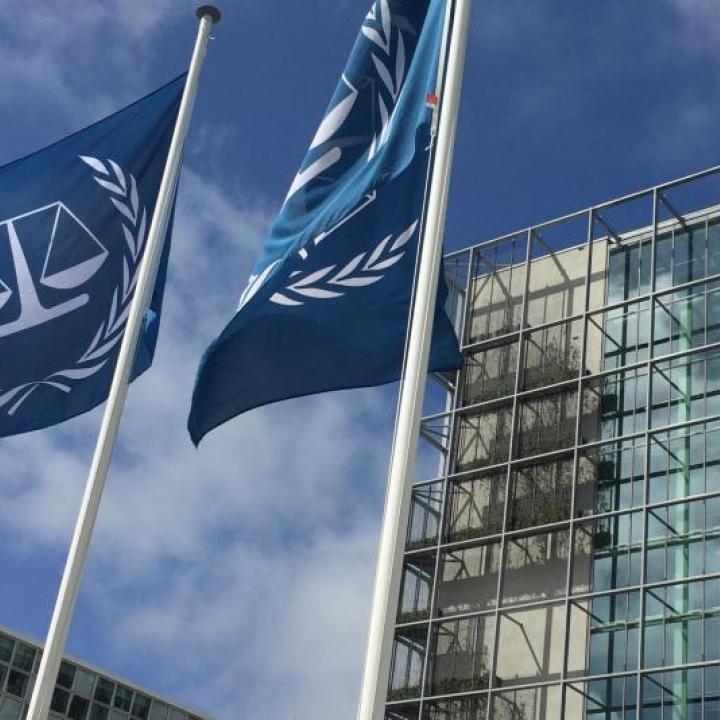
- Policy Analysis
- PolicyWatch 3305
State of Jurisdiction: The International Criminal Court and the ‘Situation in Palestine’

The question of whether the ICC is able to proceed with cases against Israeli and Palestinian officials may hinge on fuzzy international legal criteria and competing arguments by sympathetic governments.
For some time, and since December in particular, the International Criminal Court (ICC) has been weighing questions of its jurisdiction on war crimes and other serious violations allegedly “committed in all parts of the territory of the State of Palestine.” Israeli and Palestinian officials have expressed their views on the matter, as have various other states, organizations, and individuals. The ICC Office of the Prosecutor (OTP) now has until April 30 to respond to these submissions, extending the original deadline due to the coronavirus pandemic.
If ICC prosecutions are carried forward on these matters, any number of Israeli and Palestinian citizens may find themselves in the dock at The Hague, potentially including senior politicians and military officers. An in-depth look at the court and the legal background of its pending jurisdictional questions is therefore in order.
ABOUT THE COURT
The ICC is a permanent international tribunal established by a treaty, the Rome Statute, on July 1, 2002. Its mandate is “to exercise its jurisdiction over persons for the most serious crimes of international concern,” defined as “the crime of genocide,” “crimes against humanity,” “war crimes,” and “the crime of aggression.” Importantly, the ICC’s jurisdiction is “complementary to national criminal jurisdiction.”
As of this writing, 123 states are party to the statute. The United States and Israel signed it in 2000, yet both notified the UN secretary-general two years later that they would not ratify it and are therefore not be bound by any obligations ensuing from it. Without such ratification, they are not party to the treaty. As for other states that are not parties to the statute, they have the opportunity to accede to it by depositing their instrument of accession with the UN secretary-general.
THE “SITUATION IN PALESTINE”
On January 2, 2015, Palestinian officials deposited their ICC accession instrument with then-secretary-general Ban Ki-moon, who indicated that the Rome Statute would “enter into force for the State of Palestine on 1 April 2015.” At the same time, he noted that “it is for States to make their own determination with respect to any legal issues raised by instruments circulated by the Secretary-General.”
On May 22, 2018, Palestinian foreign minister Riyad al-Maliki referred the “Situation in Palestine” to the OTP, requesting that the ICC prosecutor “investigate, in accordance with the temporal jurisdiction of the Court, past, ongoing and future crimes within the court’s jurisdiction, committed in all parts of the territory of the State of Palestine.” According to the request, “The State of Palestine comprises the Palestinian Territory occupied in 1967 by Israel, as defined by the 1949 Armistice Line, and includes the West Bank, including East Jerusalem, and the Gaza Strip.”
As mentioned above, any future ICC prosecutions regarding the “Situation in Palestine” could involve bringing Israeli and Palestinian citizens before the court’s judges in The Hague. On the Israeli side, trials could be initiated against current or former political and military figures, including top leaders such as Binyamin Netanyahu and Benny Gantz. On the Palestinian side, members of Hamas and other militant groups may be among the accused.
Yet the ICC’s jurisdiction is limited to crimes allegedly committed either on the territory of states that are party to the Rome Statute (including their registered vessels and aircraft) or by nationals of these states. Since Israel is not a party to the statute, the question currently being considered is whether the “State of Palestine” can be considered a party.
On December 20, 2019, after conducting the mandatory preliminary examination, ICC prosecutor Fatou Bensouda announced that “all the statutory criteria...for the opening of an investigation have been met.” Given the situation’s “unique and highly contested legal and factual issues,” however, she decided to seek an ICC Pre-Trial Chamber I ruling “on the scope of the Court’s territorial jurisdiction in the situation of Palestine, and to confirm that the ‘territory’ over which the Court may exercise its jurisdiction under article 12(2)(a) comprises the West Bank, including East Jerusalem, and Gaza.”
That same day, Israel published its own position on the matter, stating that the ICC does not possess territorial jurisdiction because “Palestine” cannot be considered a state, mainly due to its lack of effective control over the territory it claims. The Palestinians submitted their position to the court on March 16, 2020, pointing out the large number of countries and international organizations for which Palestine is a state, and noting the need for the ICC to rule on its jurisdiction in accordance with the purpose of its founding statute. The pre-trial chamber also permitted seven states and thirty-six organizations/individuals to submit their observations by March 16, asking the OTP to respond by March 30; the deadline was later extended by one month.
STATES ON STATEHOOD
The seven states that submitted observations were Australia, Austria, Brazil, Czechia, Germany, Hungary, and Uganda. All seven argued that the “State of Palestine” does not presently satisfy the conditions to be considered a state as intended in article 12(2)(a) of the Rome Statute. It is worth comparing this stance to their voting patterns on Palestinian membership in the UN Educational, Scientific, and Cultural Organization (October 31, 2011), and on the adoption of UN General Assembly Resolution 67/19 (December 4, 2012), which established Palestinian “non-member observer State status in the United Nations”:
Also notable is each state’s relationship with Israel. Three of the seven states—Australia, Czechia, and Germany—had cultivated particularly strong relations with Israel, frequently proving sympathetic to its concerns and positions, well before the Palestinian situation was referred to the ICC. As for the other countries, media reports have pointed out increasingly cordial relationships between Prime Minister Netanyahu and the leaders of Austria, Brazil, Hungary, and Uganda.
The United States and Canada, which have often shared Israel’s positions in international forums, did not request leave from the ICC to submit amicus curiae observations regarding the “Situation in Palestine.” In a February 14 letter to the court, however, the Canadian Foreign Ministry repeated the position it first expressed after the Palestinians requested accession to the Rome Statute—namely, that Palestine “does not meet the criteria of a state under international law and is not recognized by Canada as a state.” Netanyahu reportedly wrote to Prime Minister Justin Trudeau explicitly asking for this show of support. Likewise, in a December 20 statement, Secretary of State Mike Pompeo reiterated the U.S. stance that the “Palestinians [do not] qualify as a sovereign state” and should therefore not participate in international organizations in that capacity.
The Palestinians are not alone in maintaining that the ICC possesses the necessary jurisdiction. Their position is backed by amicus curiae submissions by the League of Arab States, representing twenty-two countries, and the Organization of Islamic Cooperation, representing fifty-seven countries (Palestinian membership is included in these figures; Syria is included as well, despite its ongoing suspension).
INTERNATIONAL LEGAL CRITERIA IN A POLITICAL CONTEXT
Although international law is sometimes characterized by black and white concepts, neither statehood nor its recognition has proven to be neatly definable. The Palestinian case is not the only illustration of this phenomenon (e.g., see Kosovo), but it is among the most intricate.
According to states that back Israel’s position, ICC jurisdiction needs to be assessed pursuant to the Rome Statute and, since that is an international treaty, the Vienna Convention on the Law of Treaties. This means resorting to the traditional criteria for statehood under international law, which normally require effective government control over the territory in question. At present, the Palestinian Authority exerts only a limited type of control in certain portions of the West Bank—namely, “Areas A and B” —and none in the Gaza Strip or East Jerusalem. Similarly, its criminal jurisdiction in these areas is limited and does not extend to Israelis. As a result, it is difficult to determine which “national” jurisdiction the ICC’s jurisdiction would complement in this case.
Yet the court may note the relativity that sometimes rears its head when applying statehood criteria. For instance, Taiwan is recognized by just fifteen states worldwide, despite largely fulfilling the traditional criteria, whereas Somalia was still considered a state long after its central government collapsed. A treaty’s purpose also needs to be considered when interpreting its provisions; the ICC was established with the goal of not letting allegations of serious crimes go unscrutinized. If the court accepts that Palestine possesses sufficient characteristics of a state, it could rule that it has jurisdiction to investigate alleged crimes in the West Bank, East Jerusalem, and Gaza, regardless of whether the alleged perpetrators are Israeli or Palestinian.
In light of these intricacies, it seems an onerous task to consider international legal arguments related to the Rome Statute or Palestinian statehood without any connection to the international political context in which they are put forward. It does not seem coincidental that countries with good Israeli relations tend to uphold Israel’s legal claims on these issues, while Palestinian legal arguments are championed by countries that share the Palestinians’ language and/or majority religion.
Two of international law’s biggest challenges are evident here. One concerns the fact that some international legal criteria are less clear-cut than concepts developed within domestic legal systems. The other is the lack of law enforcement at a global level. In certain areas of international law, the transfer of jurisdictional power to an authority above states has taken place only partially or not at all, as illustrated by the world’s partial adherence to the ICC.
This multilevel fuzziness is illustrated perfectly by the “Situation in Palestine,” in which both sides claim that any ruling contrary to their position would indicate that the ICC is politicized. It is now up to the court, and its Pre-Trial Chamber I in particular, to satisfy itself that it can decide the jurisdiction question on the basis of (sufficiently) legal arguments.
Alexander Loengarov is a visiting fellow with the international and European law program at Vrije Universiteit Brussel, and an official at the European Economic and Social Committee. The author acts in his own name: this PolicyWatch solely expresses his views and does not reflect in any way the opinion of the European Economic and Social Committee and/or the European Union, which cannot be held responsible for any use made of it.



